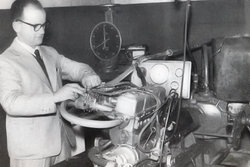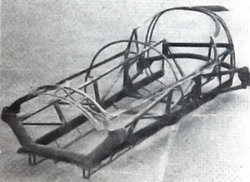Bandini formula junior
The 'Bandini junior formula' is a car racing produced by 1959 1962 from Bandini Cars Forlì.
The formula was a junior category promotional designed Europe and United States to start young drivers racing career, allowing a deserved better visibility beyond national boundaries.
For this reason, the technical regulation contained rules that restrict the project costs and operational expenses. In an effort to flatten the differences between different cars, engines had to come necessarily from auto series produced in a large number of units on which they were allowed limited interventions. The choice of Bandini, as well as that of many other car fell on Fiat 1100 / 103. The most obvious changes to the propeller riguardarono conducted particolori of carburetors, changes to tested, a new cup oil, and fasature that carried the maximum power up to 90 hp @ 6900 rpm. For a better weight distribution, and the passage of piantone steering, the engine was placed at the center of body and tilted 15 ° along the longitudinal axis. The box steering could well be in a perfect position to avoid bump and roll steer.
The formulajuniorwere prepared in the new headquarters of Via Bertini and most of them were exported to America through the importer Biener of New York. On one of these cars, among others, made one of his first experiences agonistihe Roger Penske, famous pilot, team managers and industrial America.
The frame
For this new category single-seater was developed a chassis designed specifically built to Bandini with elements mixed-section round and elliptical. The rear suspension saw for the first time on a Bandini, the application of De Dion system with the adoption in some cases even a leveraggio of Watt. All'anteriore however, the suspension system is triangles overlapping with the ability to adjust quickly camber. The steering adopt a solution anti-Ackermann.
On a esmplare was tested, this is a novelty, the solution to independent multilink rear wheels with anti-bar and telescopic hydraulic shock absorbers and springs elicoidaci cylindrical cosassiali inclined.
The solution of differential quick change of relations introduced on formula threewas also used onjuniorfor the same purpose but implemented through a new merger and secured to the frame. This also made it possible adjustment of the angles characteristic of rear.
- Structure and material: a tower pipe section elliptical and round, steel special derivation aeronautics;
- Suspensions:
- Front: Independent, triangles overlapping with stabilizing bar, camber recordable
- Rear: a bridge rigid DeDion with shock vertical telescopic hydraulic and springs cylindrical helical coaxial;
- as a wheel independent multilink with lower triangle, shock hydraulic telescopic inclined bound to portamozzo and springs cylindrical helical coaxial camber, caster and convergence Recordable
- Braking system:
- Steering: a worm
- Guide: single, central location
- Wheels: ray Borrani or Light Amadori or Campagnolo 12 "-13" -14 "
- Tank: 40 Litres
- Transmission: differential central position reversed box with quick change of relations (6 reports available) and semiassi reached with the rear omocinetici
- Weight total: 404 kg
- Top speed: 210 km / h
- Pass 2066 mm
- Track:
- Length: 3600 mm
The engine == ==

The engine Fiat 1100/103 is inclined along the longitudinal axis of 15 °, allowing positioning at the heart of chassis for better weight distribution
- Positioning: forward longitudinal, 4-cylinder in-line tilted 15 °
- Bore: 68 mm
- Running: 75 mm
- Capacity: 1089.5 cm ³
- Compression ratio: 9.8:1
- Power: 2 carburettors Weber 38DCOE body double / 40DCOE
- Power: 90 hp @ 6900 rpm
- Lubricate: Carter wet with pump gear
- Cooling: forced liquid with centrifugal pump, radiator tilted front
- Currency and clutch: Fiat 4 + marches RM, clutch monodisco dry
- Ignition and electrical equipment: coil and distributor switch on base, battery 12 V
The Body
The single-seater bodywork in aluminium, construction Bandini, offers simple lines, in full style "formula one" during the period.
The front part, in various configurations, is consistently low and brings air needed for cooling through a rectangular opening smussata or semicircle. Conversely tail, which has a lower door to enter the differential is high, voluminous and rounded.
Both sides are set to the frame by screws, while the engine bonnet, which reaches the seat of the pilot, is set with two constraints quick release. Two air-intakes lateral horizontal elements to allow the hot air vent on the bonnet hand, is derived the taking of fresh air for carburettors.
Related Items
| Bandini Automobili | |
|---|---|
| Barchette: "La prima" 1100/46 | 1100 sport | 1100 Siluro (Torpedo) | Bandini-Maserati 1500 | 750 sport Siluro (Torpedo) | 750 sport internazionale "saponetta"
Formula: Formula 3 | Formula junior
|







